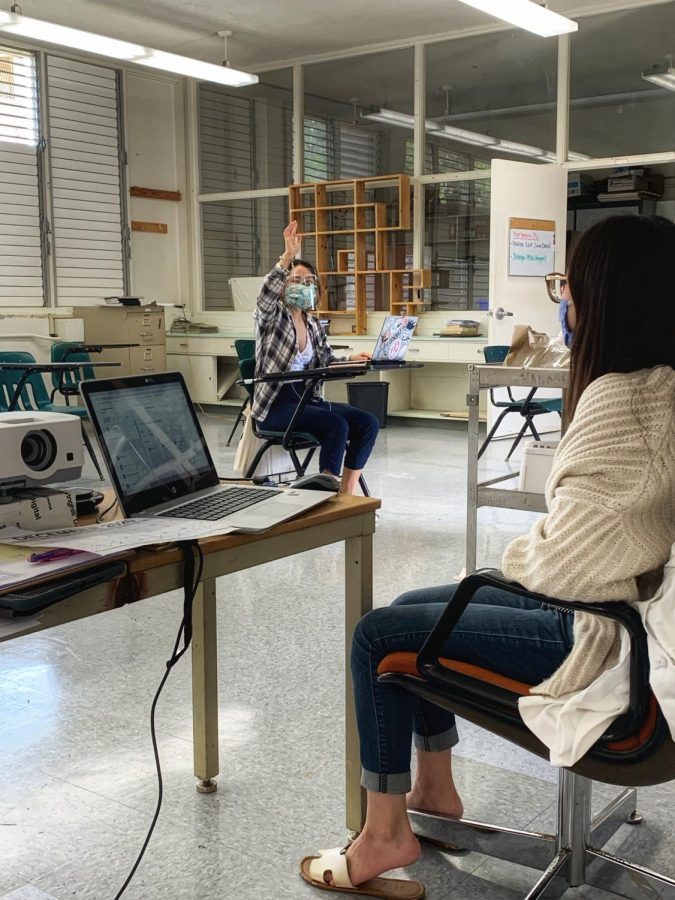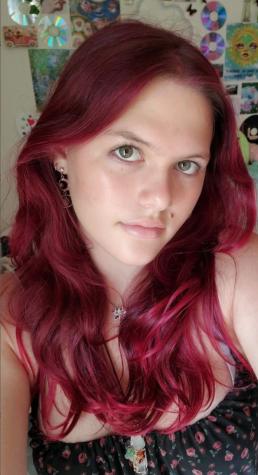A vaccine could be the key to defeating COVID-19
Bethlyn Tanabe (12) raises her hand in Ms. Carlyn Yoshina’s marine science class. Seniors returned to campus in a hybrid schedule on Nov. 23, but many opted to stay at home and work online. Ms. Yoshina’s class has seven seniors total, but usually only half of the seniors come to campus to learn in-person. Three companies—Pfizer, Moderna and AstraZeneca—have announced promising results of clinical trials on their vaccines and many believe education professionals should be the first the receive the treatment. Photo by Ka Leo staff Dec. 3, 2020.
December 3, 2020
With more than 1.3 million recorded COVID-19 fatalities and cases of the virus expected to spike as the winter season approaches, the prospect of a coronavirus vaccine has been a hot topic. On Monday, Nov. 23, the drug maker Moderna was the first to announce that its coronavirus vaccine was highly effective, sparking the belief that a vaccine could be available in the near future.
When a COVID-19 vaccine is released, it is essential that we vaccinate ourselves against the virus.
Within the next few weeks, Moderna plans to apply to the Food and Drug Administration for emergency authorization to release their vaccine to the public. According to the Centers for Disease Control and Prevention (CDC), in order for a COVID-19 vaccine to be used in an Emergency Use Authorization (EUA), the known and potential benefits of the vaccine must outweigh the known and potential risks of the vaccine.
The CDC website explains that the benefits of an effective widespread coronavirus vaccine would be substantial in the fight to end this epidemic.
Following social distancing guidelines and wearing masks helps reduce your chance of contracting and spreading the virus. A vaccine, however, would directly work with your immune system so that it will be ready to fight against the virus if you are exposed.
Dr. Emilani Crow, a board-certified family physician, said that vaccinating yourself when a coronavirus vaccine becomes available is “extremely important.”
“It’s not only important to protect you, but it’s to protect your family members and your community,” Dr. Crow stated. “It also helps to protect those that for some reason or another, are not able to get vaccinated.”
Dr. Crow explained that she has full trust in the safety and effectiveness of an FDA approved coronavirus vaccine.
“The FDA uses a very rigorous [and] scientific-based process in order to approve vaccines and medications,” Dr. Crow said. “Something that has been approved by the FDA I would feel very confident [in].
According to a September 2020 poll by Pew Research Center, nearly half of Americans say they would probably or definitely not get vaccinated if a coronavirus vaccine was available to them.
The poll revealed that the two major reasons why people are not planning to get vaccinated when a vaccine is released are concern about side effects and uncertainty of its effectiveness.
In addition, those who are hesitant to get vaccinated argue that an ineffective vaccine could increase the spread of the virus because people who think that they are immune may stop adhering to social distancing guidelines.
While this concern is valid, according to the U.S Department of Health and Human Services (DHHS), a phase 1 clinical trial of the experimental coronavirus vaccine revealed that the vaccine is safe and has a high effective rate of 94.5%. In addition, out of the 45 participants in the trial, none experienced any serious side effects. Further trials are underway to continue to ensure the effectiveness and safety of the vaccine.
When an FDA approved vaccine is released, it is vital that we vaccinate ourselves against the virus.
The impacts of COVID-19 have been tragic, to say the least. As the last several months have shown, efforts to social distance have not been enough to combat this virus. A coronavirus vaccine could be the breakthrough we need in order to end this epidemic.
Works Cited:
Tyson, A., Johnson, C., & Funk, C. “U.S. Public Now Decided Over Whether To Get COVID-19 Vaccine.” Pew Research Center, 17 Sept. 2020.
Cinch, Michael. “A Covid-19 vaccine, amazingly, is close. Why am I so worried?” STAT, 31 July 2020.
“Experimental Coronavirus Vaccine is Safe and Produces Immune Response.” U.S Department of Health and Human Services, 21 July 2020.
“Benefits of Getting a COVID-19 Vaccine.” Centers for Disease Control and Prevention, 24 Nov. 2020.
Macarthur, Sam. “Fast-Tracking Coronavirus Vaccines: The Benefits And The Risks.” MPH online.



